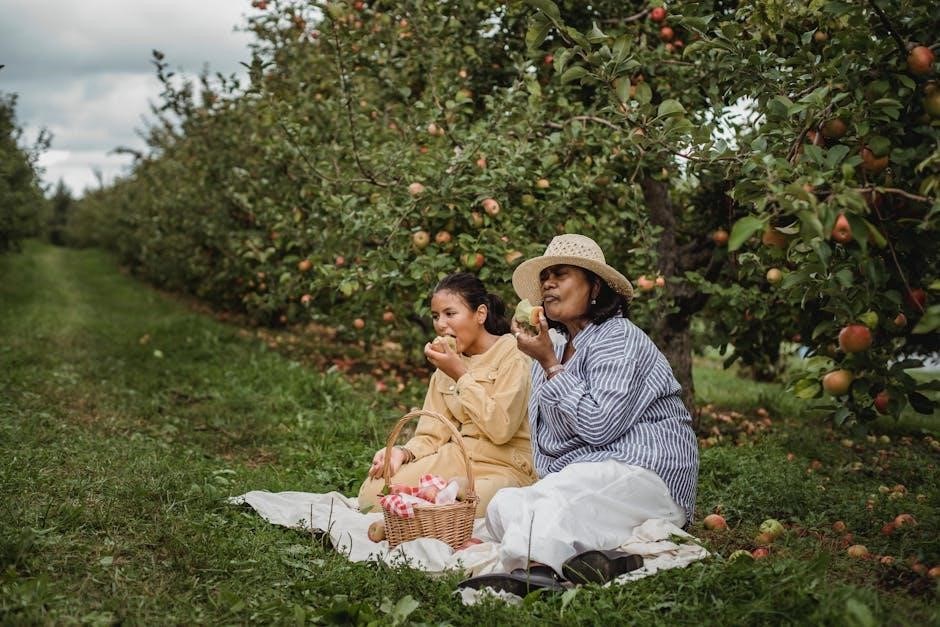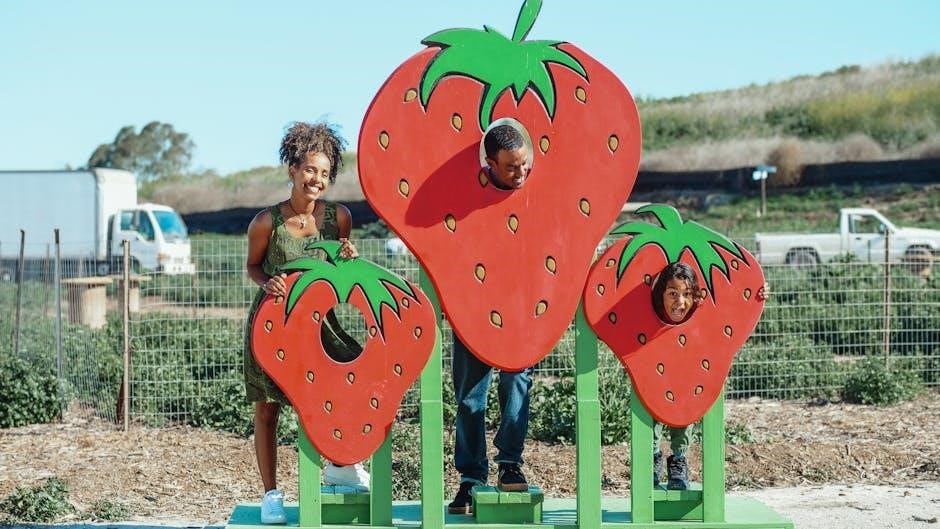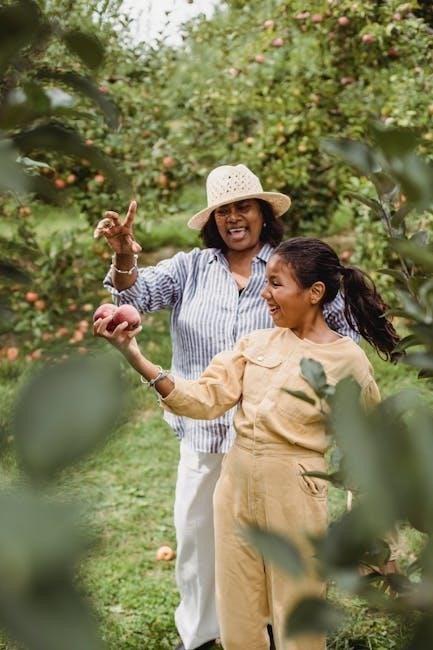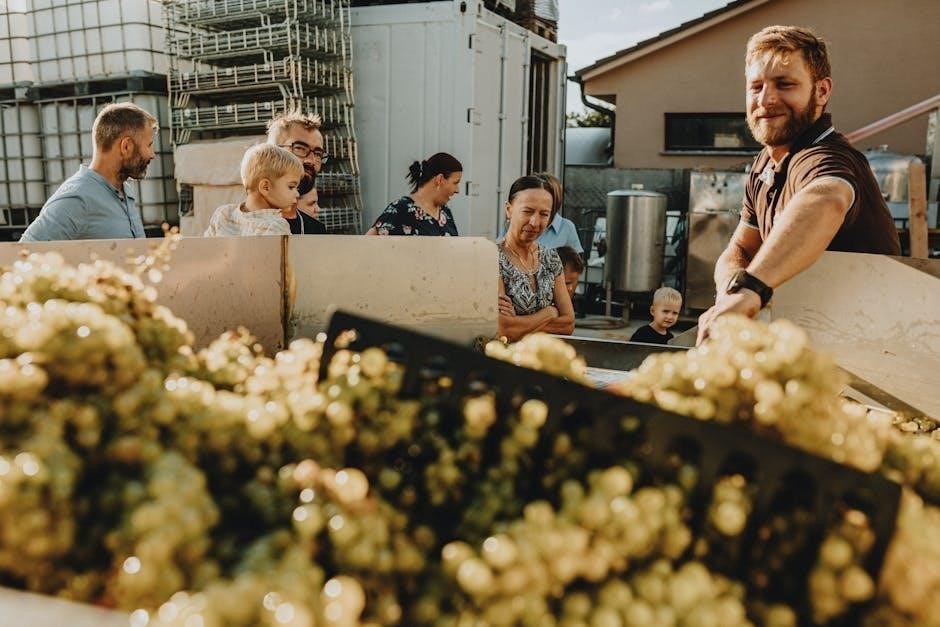
Farming offers parents a unique opportunity to educate children about agriculture, nature, and sustainability. It fosters a deep connection with the environment and promotes practical life skills.
By involving kids in farm activities, parents can teach responsibility and work ethics, creating a foundation for a resilient and resourceful future generation of farmers and leaders.
1.1 Understanding the Basics of Farming
Farming is the practice of cultivating land, raising livestock, and producing food. It involves understanding soil, crops, and animal care. Parents can introduce children to these fundamentals, fostering an appreciation for nature and sustainability. Learning about farming basics helps kids grasp where food comes from and the importance of responsible land use, laying a strong foundation for future involvement in agriculture.
1.2 The Role of Parents in Farming Education
Parents play a crucial role in farming education by guiding children through hands-on experiences and sharing knowledge. They can create a safe environment for kids to learn about agriculture, fostering curiosity and practical skills. By modeling responsible farming practices, parents inspire a love for the land and prepare the next generation to contribute to sustainable farming and food production effectively.

Safety on the Farm
Farm safety is crucial for protecting children from hazards like machinery, animals, and chemicals. Parents must teach awareness and safe practices to ensure a secure environment.

2.1 Identifying Potential Hazards
Farm environments present unique risks, including machinery, animals, and chemicals. Parents must identify these hazards to create a safer space for children. Regularly inspecting equipment, securing toxic substances, and monitoring animal behavior are essential steps. Teaching children to recognize dangers, such as sharp objects or unstable structures, helps prevent accidents. Supervision and clear guidelines ensure a safer farm experience for the whole family.
2.2 Teaching Children Farm Safety Practices
Teaching farm safety is crucial for children’s well-being. Parents should demonstrate proper practices, such as wearing protective gear and avoiding machinery. Supervising kids during farm activities ensures they follow guidelines. Clear communication about risks, like staying away from large animals or sharp tools, helps build awareness. Encouraging responsible behavior fosters a culture of safety, protecting children and creating a secure farm environment.

Educational Opportunities on the Farm

Farms provide hands-on learning experiences, teaching children about agriculture, nature, and sustainability. Engaging in farm activities fosters practical skills and a deep connection with the environment.
3.1 Learning About Agriculture and Nature
Farms serve as living classrooms, offering insights into agriculture and nature. Children learn about crop cycles, animal care, and ecosystems, fostering a deep appreciation for the environment. Hands-on experiences, like planting and harvesting, enhance understanding of sustainable practices and the interconnectedness of living organisms. These lessons not only educate but also inspire a lifelong connection with nature and conservation.
3.2 Engaging Kids in Farm Activities
Engaging children in farm activities fosters curiosity and responsibility. Assign age-appropriate tasks, such as feeding animals or planting seeds, to encourage participation. Provide clear instructions and supervision, ensuring safety while building confidence. Positive reinforcement and praise for their efforts can create a sense of accomplishment, making farming a enjoyable and educational experience for kids of all ages and skill levels.

Emotional Well-Being and Farm Life
Farm life nurtures emotional well-being by fostering resilience through responsibility and connecting families with nature, providing a calming environment that reduces stress and promotes mental balance;
4.1 Building Resilience Through Farm Work
Farm work teaches children resilience by exposing them to challenges and responsibilities. Physical labor, problem-solving, and adapting to nature’s unpredictability foster determination and perseverance. The hands-on experience helps kids understand failure as a learning opportunity, while the rewarding outcomes of their efforts build confidence and mental strength, preparing them for life’s adversities.
4.2 Managing Stress in a Farm Environment
Farm life can be stressful due to unpredictable weather, long hours, and physical demands. Parents can manage stress by fostering open communication with family members, encouraging shared responsibilities, and prioritizing downtime. Involving children in stress-relief activities, like outdoor games or mindfulness exercises, helps create a balanced and supportive farm environment for everyone.
Involving Kids in Farm Responsibilities
Involving children in farm tasks teaches responsibility and work ethics, fostering a sense of accomplishment and connection to the land. Assigning age-appropriate duties helps build their confidence and skills, preparing them for future roles in farming or beyond.
5.1 Assigning Age-Appropriate Tasks
Assigning tasks based on a child’s age ensures they contribute meaningfully without feeling overwhelmed. Younger children can gather eggs or water plants, while older kids can manage animal care or harvest crops. Clear instructions and supervision help build confidence and a strong work ethic, fostering a sense of responsibility and connection to the farm’s operations.
5.2 Teaching Responsibility and Work Ethics
Farming provides a practical platform for teaching children responsibility and work ethics. By assigning consistent tasks, parents help kids understand accountability and the value of hard work. Celebrating their contributions reinforces self-esteem, while guiding them through challenges builds resilience and a strong moral foundation essential for their future.

Health and Wellness on the Farm
Farming promotes active lifestyles and balanced nutrition, enhancing physical and mental well-being. Encouraging healthy habits and safety practices fosters a holistic approach to family health.
6.1 Maintaining a Healthy Lifestyle
Farming environments naturally promote physical activity and balanced nutrition. Parents can encourage healthy eating by incorporating fresh, farm-grown produce into meals, ensuring a diet rich in nutrients.
Regular exercise through farm work and outdoor activities enhances physical health. Additionally, fostering mental well-being through stress management and community support is essential for a holistic approach to family health and wellness.
6.2 Nutrition and Meal Planning for Farm Families
Farm families benefit from fresh, seasonal produce, allowing for nutrient-rich meals. Parents can plan balanced diets using homegrown ingredients, ensuring variety and wholesomeness for their children.
Meal planning should include protein sources, whole grains, and vegetables. Involving kids in food preparation fosters healthy eating habits and appreciation for sustainable living, promoting long-term health and well-being.

Community and Social Aspects of Farming
Farming strengthens community bonds through shared knowledge and resources. Families often collaborate, fostering a sense of belonging and mutual support. Participating in local events and traditions further enhances social connections, creating a vibrant and inclusive farm culture.

7.1 Building Connections with Other Farm Families
Farming communities thrive on collaboration and mutual support. Parents can connect with other farm families through cooperative activities, shared resources, and social events. These interactions foster trust and camaraderie, creating a network that benefits both children and adults. By engaging in collective efforts, families strengthen ties and build lasting relationships, enriching their farm life experience.
7.2 Participating in Local Farming Events
Local farming events provide a platform for parents and children to engage with the community. From harvest festivals to agricultural fairs, these gatherings offer hands-on learning opportunities and cultural enrichment. Participating in such events fosters a sense of belonging and teaches children about the importance of agriculture in their region, while also promoting social interaction and shared learning experiences that are both fun and educational.
Preparing for the Future of Farming
Preparing for the future involves passing down farming knowledge and encouraging the next generation to adapt to new technologies and sustainable practices, fostering a passion for agriculture.
8.1 Passing Down Farming Knowledge
Passing down farming knowledge is essential for preserving traditions and ensuring the next generation understands sustainable practices. Parents can share skills through hands-on activities, storytelling, and formal education, creating a legacy of agricultural expertise and environmental stewardship. This approach not only strengthens family bonds but also equips children with the tools needed for future farming challenges and opportunities.
8.2 Encouraging the Next Generation of Farmers
Encouraging the next generation of farmers involves fostering a passion for agriculture through hands-on learning and mentorship. Parents can inspire children by involving them in farm activities, teaching the value of hard work, and showcasing the rewards of cultivating the land. This approach nurtures a deep appreciation for farming and equips young minds with the skills and confidence to pursue agricultural careers.
Raising children on a farm offers unique opportunities for growth, learning, and resilience. Parents play a vital role in guiding their kids through the challenges and rewards of farm life, fostering a strong connection to nature and community while preparing them for future success.
9.1 Summarizing Key Takeaways
- Agriculture education and hands-on learning are vital.
- Safety practices must be prioritized to protect children.
- Responsibility and work ethics are key life skills.
- Community connections enrich farm life experiences.
9.2 Final Thoughts on Parenting in a Farm Environment
Parenting on a farm is a rewarding journey that fosters resilience, responsibility, and a deep connection to nature. By embracing farm life, parents can create a nurturing environment where children thrive emotionally, physically, and socially. Trust, open communication, and shared values are essential for guiding kids through challenges and celebrating successes. Farming not only teaches practical skills but also instills a strong work ethic and appreciation for the land.